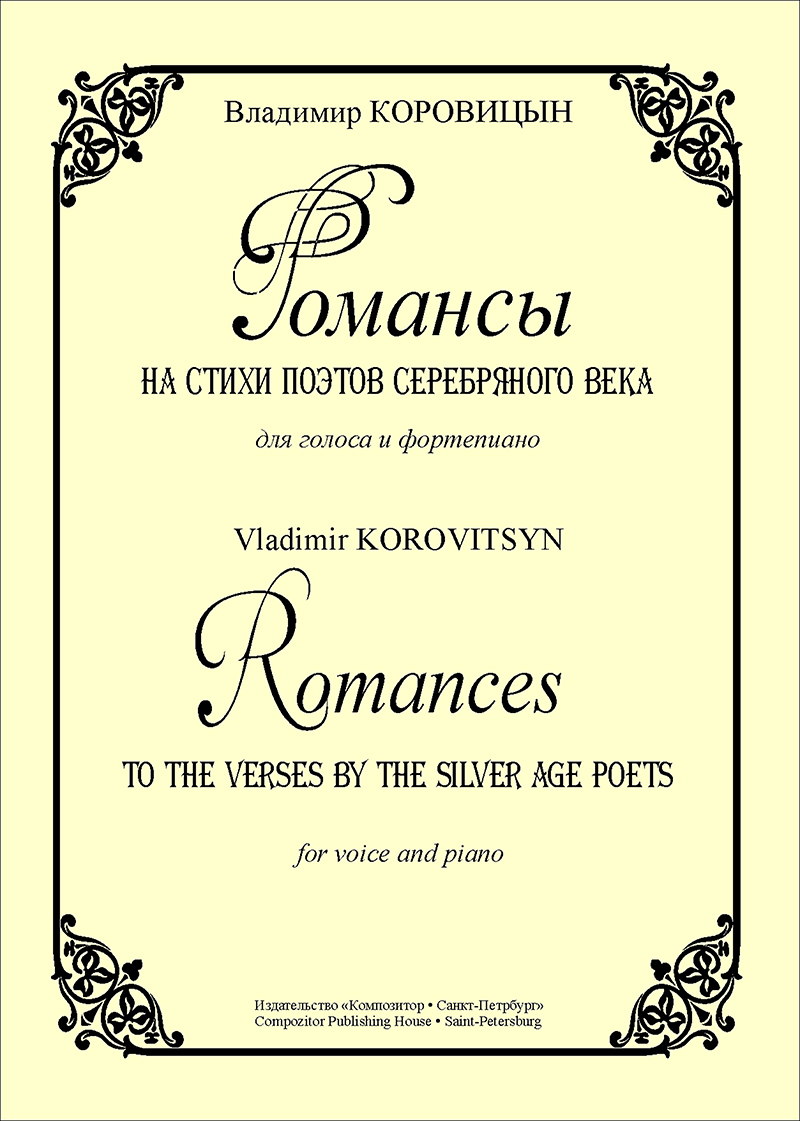
Korovitsyn V. Romances to the Verses by the Silver Age Poets for Voice and Piano
- Author:
- Korovitsyn V.
- Author (full):
- Vladimir Korovitsyn
- Title (full):
- Romances to the Verses by the Silver Age Poets for Voice and Piano
- Number of pages:
- 68
The beginning of the 20th century is used to be called the “Silver Age” in Russia. This definition was introduced by the philosopher Nikolai Berdiayev to the historical cultural system for to divide his contemporary art from the previous Golden Age in art referring to the 19th century. However, there exists the other point of view. I came across with it at the lecture of Nikita Struve, grandson of the great Peter Struve, who considered the 20th century’s beginning to have been the apex of the Russian culture, incredible and inconceivable flight.
Although both points of view are well stipulated I accept the second attitude to the Silver Age. N. Berdiayev lived that time. Its worth to watch any phenomenon from the distance for to estimate its significance for the future. N. Struve managed to do it.
Actually, Russia did never witness such an ample, fertile, mighty spiritual flourishment. None of the countries did ever give birth to such a great number of geniuses simultaneously as Russia in the second half of the 19th century. The Silver Age occurred to be the true Golden Age, the kind of the Russian Renaissance. This light streaming from the long extinguished stars shall reach for a long time everyone staying inside the Russian human paradigm, making any man return again and again to these clear white and black photos, cadres of the old news-reel, memoirs of the dead people buried at the Sainte-Genevi?ve-des-Bois, and, of course, to the poetry itself.
The poets, whose verses were used for these vocal miniatures, represent both Russian capitals. The Moscovites Marina Tsvetayeva and Boris Pasternak, Petersburgians Fyodor Sologub and Georgiy Ivanov. Vladislav Hodasevich originated from Moscow, though the longer part of his pre-emigration life he resided in Petersburg – Petrograd.
The brief introduction is not able to accomodate descriptions of every author’s styles, however, I’d like to say a few words about Georgiy Ivanov, who is undeservedly forgotten in this country, alas! It was in the middle of the 1890ies, when the full collection of the poet’s verses appeared at last. His talent revealed in full capacity. This mostly refined delicate lyrics seems to be utterly natural and easy for perception. All things are known to be difficult before they are easy. Zinaida Gippius called him the poet in pure chemical specie. Georgiy Adamovich defined his figure as the best Russian poet amongst the foreign world. «The whole world and its environments», joked Ivanov sadly.
I’d like to finish my preface on the short poem by Georgiy Ivanov (translated by A. Ardova) variations to the famous Pushkin’s utterance: «Damn made me be born in Russia with my mind and talent!»
What a pity ’tis to acquire,
Wondrous lofty gift of God
Feeling nothing to desire
Golden bliss that shall come not.
You shall waste it all in vain,
Casting pearls before the swines
As your life comes down the drain,
And you pay for gimpy whines.
Vladimir Korovitsyn
Contents:
Triolets. Vocal cycle to the verses by Fyodor Sologub
1. Do Blaze, My Candle (Music text example)
2. My Heart Palpitated With Joy
3. Waking Early in the Morning
4. Cottages of Stone
5. Let Everything be Different From the Past
Two romances to the verses by Marina Tsvetayeva
1. No, None of You Will Know
2. Prayer
Three romances to the verses by Vladislav Hodasevich
1. Ballad (Music text example)
2. ’Twas Twilight in the Street
3. Little Boat
Four Romances to the verses by Georgiy Ivanov
1. Dark Rose
2. Gold Will Come
3. Sentimental Talk
4. It Could Be Quite the Other Way
Vocal duet to the verses by Boris Pasternak (Music text example)
Lack of Luck. Verses by Georgiy Ivanov
- Author
- Korovitsyn V.
- Author (full)
- Vladimir Korovitsyn
- Title (full)
- Romances to the Verses by the Silver Age Poets for Voice and Piano
- Number of pages
- 68
